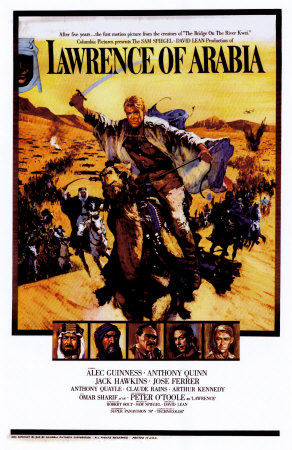In a historical diversion to the ugly, gasping news of nowadays with an item this weekend on one of my long-ago heroes — TE Lawrence, the freakish leader of the desert in World War I and accomplished writer/historian..
After seeing the David Lean movie, “Lawrence of Arabia” in ninth grade (1963), I read everything about the guy, even his “Seven Pillars of Wisdom,” but I was either too lazy or too dumb (most likely a great bit of both) to get much out of it, but did fall in literary love with “With Lawrence in Arabia,” by Lowell Thomas.
The infatuation didn’t last long — the Beatles quickly filled the void apparently found somewhere inside me with having deep thoughts on charging about the Arabian desert. In six weeks I saw “Lawrence of Arabia” multiple times (four I used to think, but now can’t remember — but still, the movie is nearly four-hours long).
I was already weird by ninth grade, easily.
Anyway, I spied an article this morning on a new manuscript found of his “Seven Pillars” indicates Lawrence really felt bad — “bitter shame” — the British Empire turned out shitty as supposed in regards to the Middle East:
Rare early copy of TE Lawrence’s Seven Pillars of Wisdom including a suppressed first chapter on the market for £65,000. By me for the Observer. https://t.co/n2dvNd9g0q
— David M Barnett (@davidmbarnett) October 30, 2022
Also maybe a reflection on our current situation there. David Barnett at the Guardian:
TE Lawrence was “continually and bitterly ashamed” of the betrayal of the Middle East following the Arab revolt in which he became a British national hero, according to a chapter in his book The Seven Pillars of Wisdom which he decided to remove before publication.
He was persuaded to remove the chapter by his friend, the Irish playwright George Bernard Shaw, and it was never printed in any edition. However, for the first time, an extremely rare copy of the manuscript – including the expunged chapter – has come to the open market with a price tag of £65,000.
Famously portrayed by Peter O’Toole in the 1962 movie Lawrence of Arabia, Lawrence was the Oxford-educated scholar and spy who helped the Arabs throw off the yoke of the Ottoman empire in the Arab revolt, at the height of the first world war. He became a British hero for his actions.
The revolt began in 1916 when the Arab military pushed back against the advancing Turkish forces from the Ottoman empire. Lawrence worked closely with Faisal I bin Al-Hussein bin Ali Al-Hashemi to help defeat the Ottomans, with the Arabs working under the illusion that this would result in a unified Arab state. However, after the conflict, the region was divided up by Britain and France, and the western countries were accused of reneging on the deal.
Lawrence’s account of the revolt, The Seven Pillars of Wisdom, was published in 1926, but in 1924 he produced a “prospectus” of just 100 copies of the opening chapters of the book to circulate around potential investors in the style of an early crowdfunding project.
In it, Lawrence, who died in 1935, maintained that his aim while in the Middle East was always to help the Arabs establish their own sovereignty.
He wrote that the Arab revolt was “an Arab war waged and led by Arabs for an Arab aim in Arabia”, and said he believed he was helping them to create “a new nation, to restore a lost influence” and to build “an inspired dream palace of their national thoughts”.
…
The deleted first chapter of The Seven Pillars of Wisdom points to the former, says Glenn Mitchell, senior specialist at Peter Harrington, the rare book dealer that has obtained this copy of the prospectus and is bringing it to market.
“This ‘suppressed’ first chapter was meant to open Seven Pillars of Wisdom,” said Mitchell. “It is an outward statement that it was Lawrence’s intention, his vision, if you like, that the Arab revolt was a war fought by Arabs for Arabs – and, ultimately, Arab independence from both Ottoman Turkey and the great powers. George Bernard Shaw thought that he shouldn’t open his book with such a statement; that it was, perhaps, too frank.”
Go read the whole piece, if you’re interested in that sort of thing.
As for me, it was a sideways journey back in time — not to WWI, but ninth grade.
Even in the desert, once again here we are…
 (Illustration out front found here).
(Illustration out front found here).